ChatGPT has made waves in the blogging industry.
There are tons of guides that encourage you to use ChatGPT to hack your way to the top of search results.
But is it all illusion? Can you actually use ChatGPT for SEO and how so?
This is a complete guide to using ChatGPT for SEO—the right way.
Times Have Changed
These days, Google (and all the other search engines) have gotten pretty good at spotting the gold among the rubble.
These days, the secret is not understanding the Google algorithm. Instead, it’s all about providing value.

As long as your blog post or page is genuinely useful for the reader, you’re on the right path.
Now, imagine having a co-author with infinite stamina, who never needs sleep, and who is always ready to help.
That’s ChatGPT.
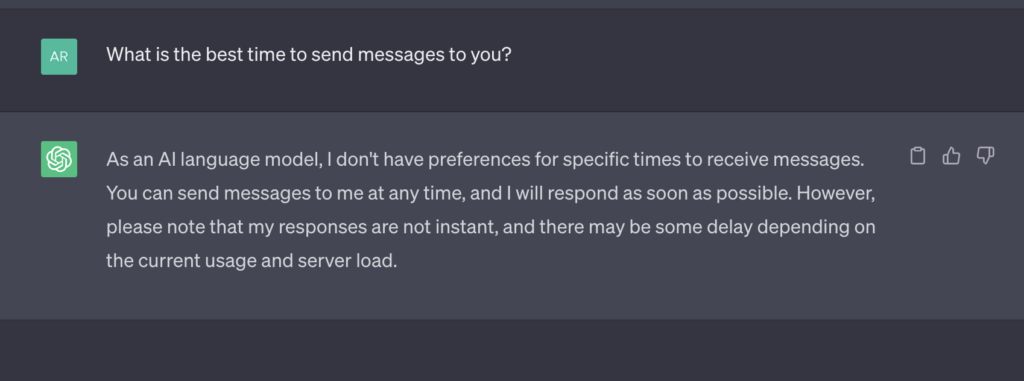
This smarty pants was created by the folks at OpenAI and it’s a real game-changer for us content creators.
But let me be clear, it’s not here to steal our jobs. Rather, ChatGPT is a helpful tool that can assist us in creating even more valuable content.
Sure, having an AI co-author sounds awesome, but let’s be honest, there’s no magic button for success.
To rank high on search results, you need to roll up your sleeves, put in the hours, and work hard to achieve your goals.
How SEO Works in 2023?
To understand how to use ChatGPT for SEO, you need to understand how SEO works in 2023.
SEO is not about technical growth hacks anymore—like it used to be. If this was the case, search engines would be pretty lousy products, right?
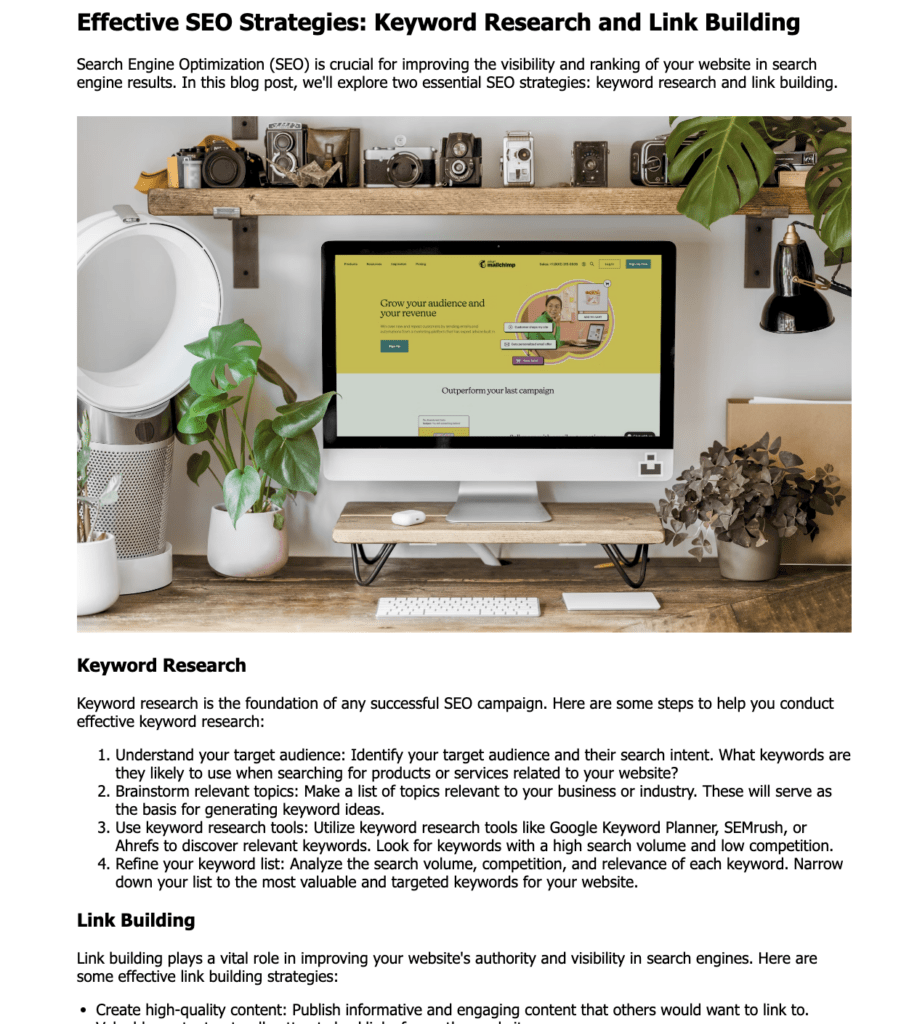
If content creation was technical, it’d be left to the SEO hackers.
People with actual knowledge and skill would not be interested in blogging, making the internet a far duller place.
Only SEO-hacked content would modify the search results.
I like to think of SEO not as “Search Engine Optimization” but more as “Serving Extraordinary Offerings”.
Cheesy, right? But it helps to remember what’s really at stake.
Surely, the acronym SEO is handy because it’s short and catchy, but don’t get it twisted — SEO isn’t about optimizing for search engines.
It’s all about crafting blog posts that provide value for your readers.
It’s All About Value
Sure, SEO does involve some technical aspects.
There’s server delay optimization, image compression, deferring code assets, and a bunch of other stuff that sounds geeky to most of us.
The good news is that most of these come built-in with your web hosting plan these days.
So, unless you’re really into the tech side of things, you can sit back and relax.
Here’s the deal: A blog post that doesn’t solve a problem for its readers won’t rank high.
No matter how many backlinks you have or how expertly you’ve inserted keywords, it won’t work.
To build an organic traffic flow from search engines, you need to provide value. You need to write long ultimate guides that actually solve problems that people are having in a particular niche.

How to Provide Value
So, you’re probably wondering, “How do I provide that value?”
Well, you’ve got to write a blog post that solves a problem—better than anyone else.
You’ve got to leave no stone unturned with your content. Write detailed, informative, and in-depth guides that solve people’s problems in your blog’s niche.
This maximizes your chances of ranking high.
Let’s illustrate this with an example.
Here is a bad blog post outline:
Title: “10 Best Dog Foods”
- Introduction
- List of 10 dog foods with brief descriptions
- Conclusion
This post is only trying to rank but isn’t actually helping anyone. It just lists out some dog foods without any real depth.
There are probably hundreds of thousands of similar posts. How could you ever stand out from the masses with this?
On the other hand, here’s a good blog post outline that actually provides value.
Title: “Choosing the Best Dog Food: 10 Health-Boosting Options”
- Introduction: Importance of high-quality dog food
- Understanding dog nutrition needs
- Factors to consider when choosing dog food
- Detailed review of 10 high-quality dog foods (benefits, potential downsides, cost, etc.)
- Tips for transitioning your dog to new food
- Conclusion and personal recommendation
This kind of post is packed with value.

It’s not just listing dog foods; it’s teaching dog owners about nutrition, giving them factors to consider, and providing detailed reviews.
So the essence of SEO is not about pleasing search engines; it’s about delighting your readers with value-packed content.
Let’s keep this in mind as we dive into the world of ChatGPT. Always write for humans—not for robots.
Enter ChatGPT
Now that you understand how SEO works and what types of blog posts rank, let’s consider ChatGPT.
Meet ChatGPT

ChatGPT is an artificial intelligence (AI) chatbot that’s been stirring up a storm in the content creation world.
It seems to have an answer to most questions.
It can whip up content that feels just as good as what we humans produce.
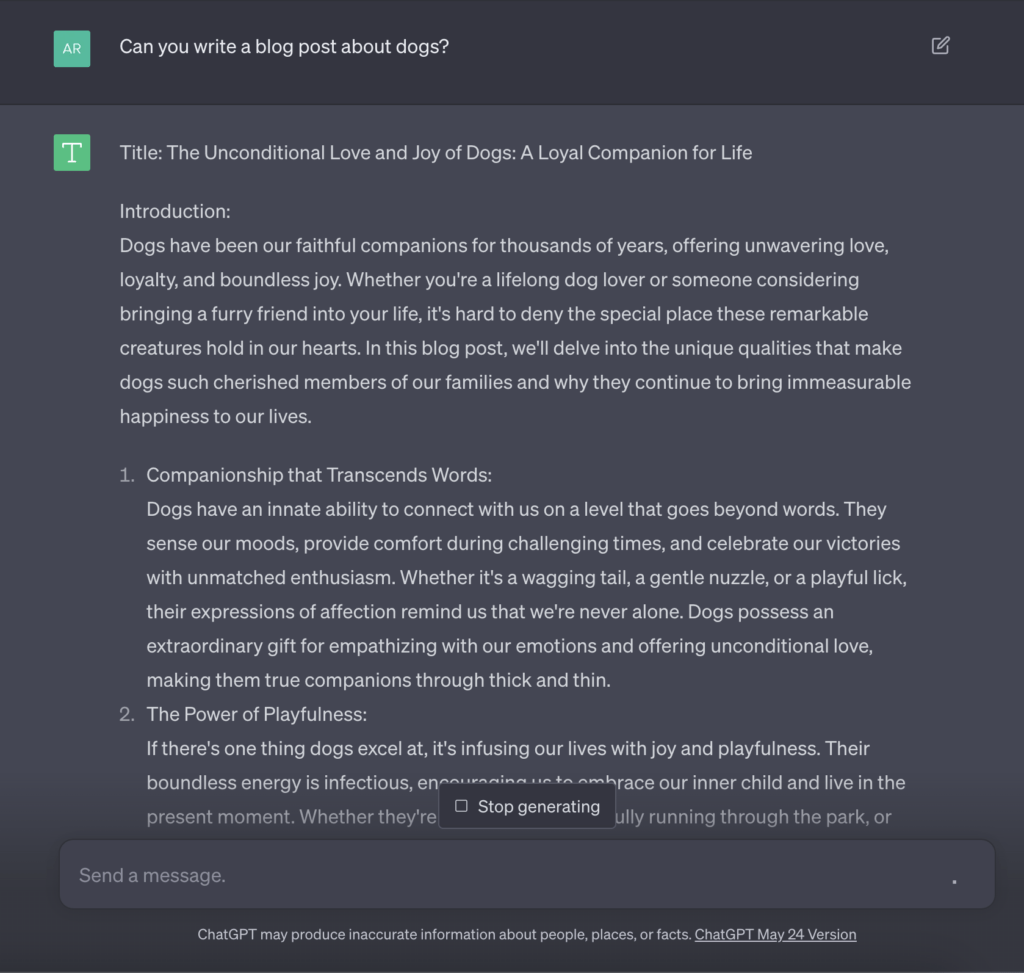
From catchy one-liners to witty jokes, and even unique song lyrics, ChatGPT does it all.
But don’t get too carried away — behind its creative genius, ChatGPT is, at its core, a mathematical model.
It’s a function that takes your input and gives an output that sounds impressively human.
But remember, there’s no guarantee that every piece of info it produces is 100% accurate. On well-researched topics, it usually nails it, but it’s not infallible.
A Tool, Not a Replacement
Despite its limitations, ChatGPT can be a kickass addition to your content creation workflow.
It never sleeps, never gets bored, and certainly doesn’t need coffee breaks.
But at the end of the day, it’s not here to replace us. We still hold the key to creating content that truly resonates with our audience.
The Myth of ChatGPT as an SEO Silver Bullet
Now, let’s tackle the elephant in the room: the hype around ChatGPT and SEO.
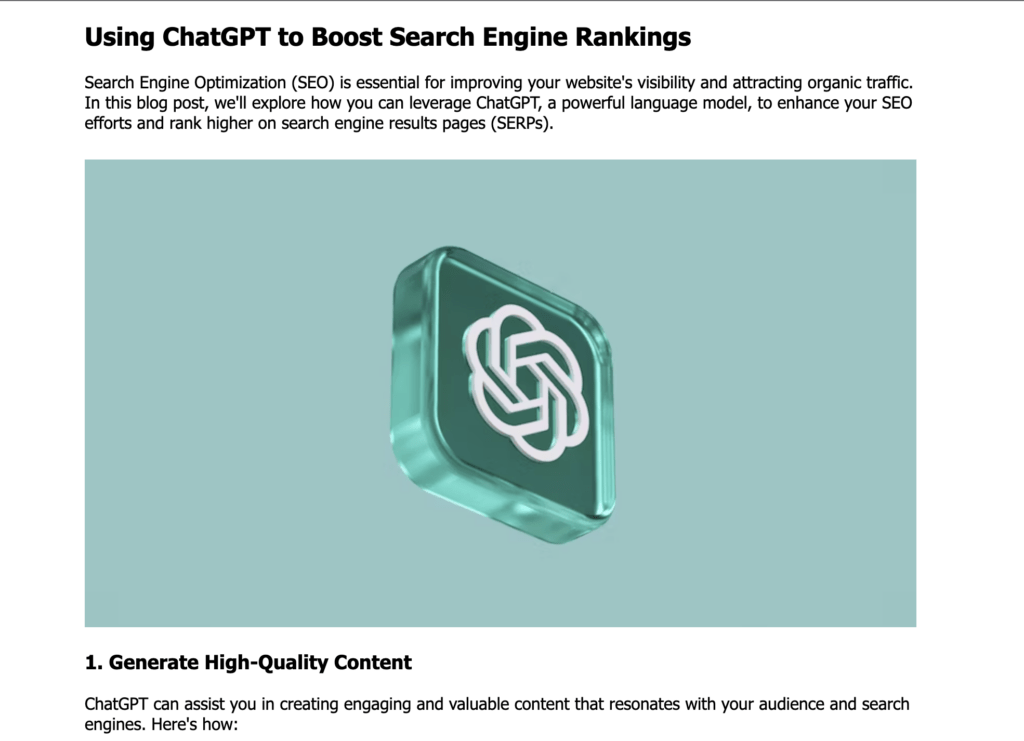
There’s a growing number of so-called ChatGPT and SEO “gurus” who swear that this AI wonder can skyrocket your blog posts to the top of the search results.
You’ve probably seen these guides popping up everywhere, making big promises.

But here’s the thing, while these guides might be getting clicks, they’re often not providing real value.
Yes, ChatGPT can help with content creation, but it’s not a magic wand for SEO success. Especially in the long run.
What Seems Too Good to Be True Usually Is
Ever heard the old saying, “If it seems too good to be true, it probably is?”
Yeah, that’s pretty spot on when it comes to those ChatGPT guides promising you can churn out 1,000 killer blog posts in a day.

I mean, it sounds great, doesn’t it? An army of blog posts, all with a few keystrokes. But hang on.
It’s not all about writing. It’s about doing the groundwork.
A successful post needs research, thought, creativity, human experience, expertise, and more.
You can’t fake that, not even with a fancy AI tool.
Sure, ChatGPT could probably spit out a ton of posts for you, but will they be original?
Will they add something new to the internet?
Will they make your readers come back for more?
Chances are, they won’t.
The idea of pumping out a ton of content with minimal effort might seem tempting. But remember, SEO isn’t about quantity; it’s about quality.
Focus on crafting valuable content, and you’ll be on the right track.
And sure, use ChatGPT as a tool to help you along the way, but don’t fall for the promise of shortcuts to success.
ChatGPT is a nifty tool that can assist in content creation efforts. But as with everything, it’s not perfect, and it certainly isn’t the silver bullet solution to topping the search rankings.
4 Problems with ChatGPT and SEO
#1 The Illusion of Uniqueness
First things first: Google doesn’t index hundreds of millions of pages to show searchers the same results again and again. Their goal is to offer users a range of answers, different angles, unique opinions, and ideas.
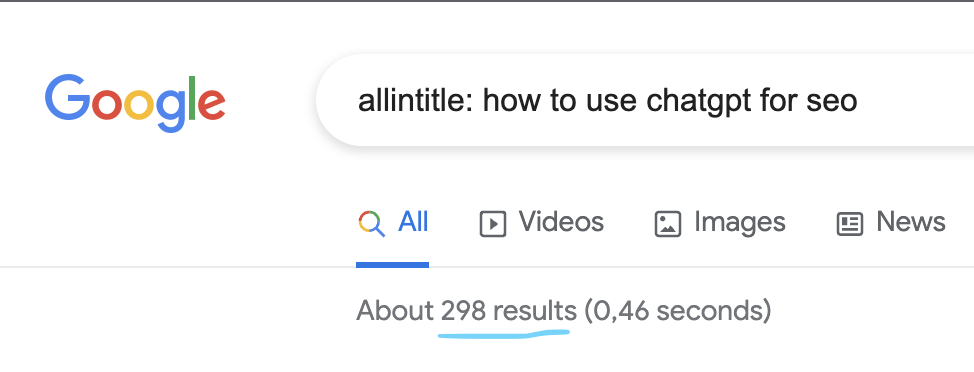
After all, that’s the thunder of search engines — it’s a huge network of different kinds of human-written content.
To outshine your competitors in the search results, spinning their content into your own words won’t cut it.
And that is essentially what ChatGPT does. ChatGPT can’t think. It doesn’t create. It doesn’t “know”. Instead, it more or less summarizes what it’s seen on the internet.
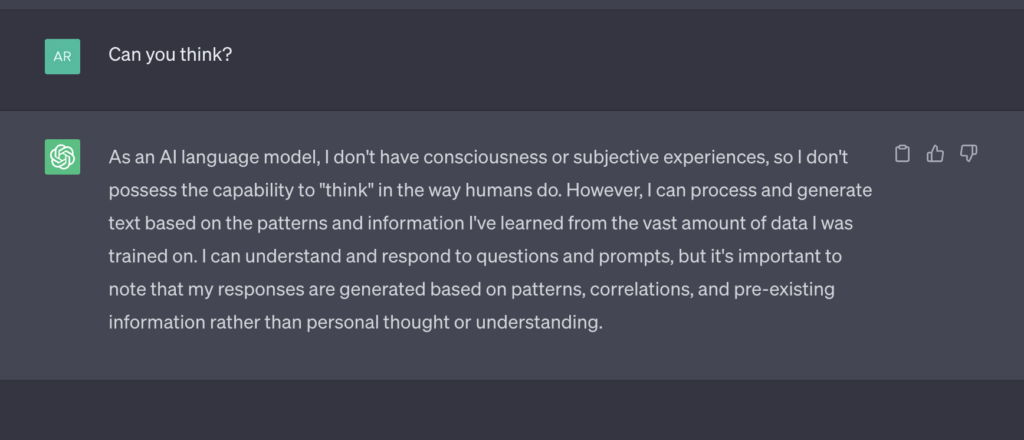
Your blog content needs to be unique, well-thought-out, showcasing your expertise and experience.
Above all, it should solve problems in a better way than anyone else has done so far.
Surpassing existing content in usefulness with ChatGPT is an uphill battle. ChatGPT’s potential is bounded by the content that already exists.
#2 No Differentiation
If you publish AI-generated content on your website, what stops your audience from asking ChatGPT directly? The answers would be more or less the same.
Sure, for now, not many people use ChatGPT. So you might even gain a momentary advantage.
But what happens in 3–6 months when search engines start using AI chats to answer searchers’ questions?
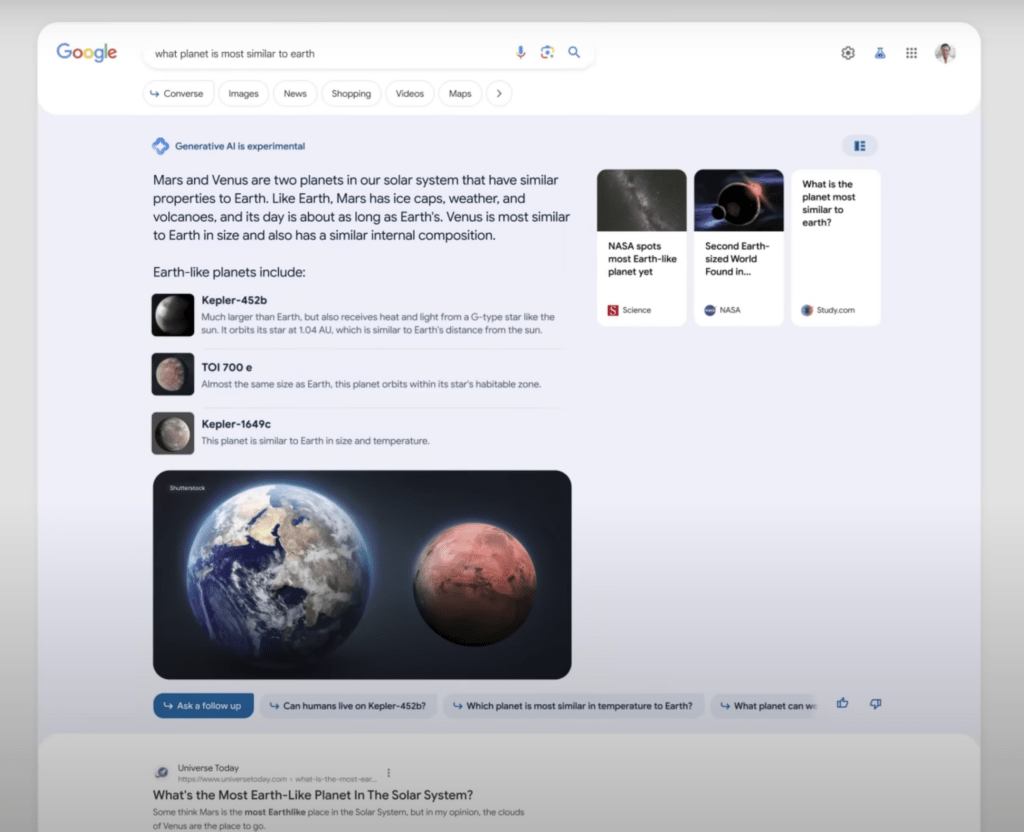
Using ChatGPT to fully automate content creation is a non-sustainable strategy.
Let’s also not forget about your competitors.
If they start generating posts on the same topics using the same AI tools, the differentiation will vanish.
Because the content will be incredibly similar, your ability to outperform competitors will come down to luck or having a higher site authority.
And if there’s any money to be made within a niche, other AI sites will saturate that niche in days. So it’s basically impossible to make a big buck with AI-generated content there.
#3 The Confidence-Issue Paradox
Lastly, let’s touch on a slightly concerning aspect of ChatGPT.
Its content can often be factually incorrect—yet it’s written very convincingly.
As much as AI has advanced, it can’t perfectly verify facts or understand the nuances of human knowledge.
This is another important factor to consider when weighing the pros and cons of using ChatGPT for SEO.
Trusting it blindly can lead to misinformation, which harms your credibility and ultimately, your rankings.
#4 Lack of Visual Content
Here’s one more limitation to ChatGPT-written blog posts: Images.
Blog posts aren’t just about the text; supporting images play a significant role in delivering value to the reader, enhancing understanding, and enriching the overall content experience.
And here’s where AI, including ChatGPT, hits a stumbling block.
While it can generate text convincingly, it simply can’t create truly contextual and useful images to support the content.
Sure, you could add some generic stock images from platforms like Unsplash, or even generate some with AI-powered tools like Midjourney or Stable Diffusion.
For example:
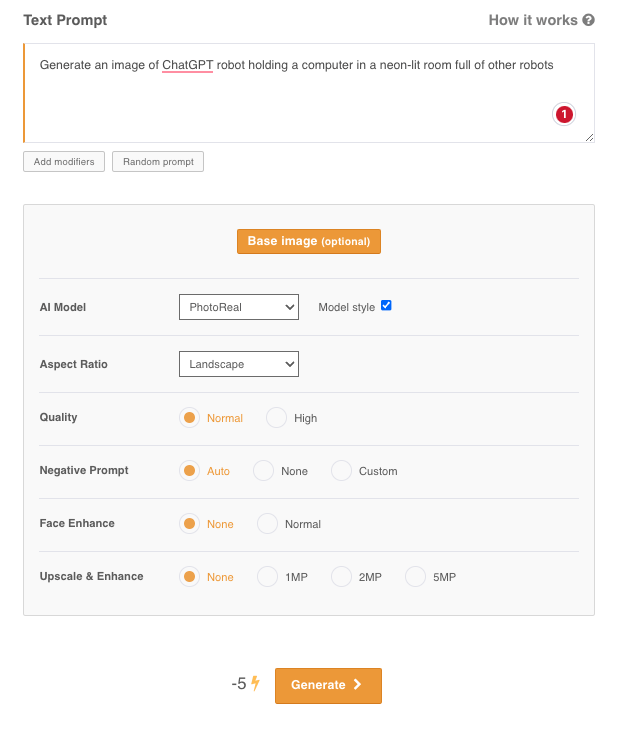
Output:

Stock images for sure make the posts more enjoyable and less of a wall of text.
But do these images truly add value to the content?
They won’t explain complex ideas, support your arguments, or provide a visual break that keeps your reader engaged.
The true value of images usually comes from those that actually support the learning, such as visual guides, infographics, or diagrams explaining complex ideas.

They provide a tangible and visual representation of the information you’re conveying, something that text can’t always accomplish on its own.
Creating this type of valuable visual content still requires human creativity and understanding, a knack for design, and an understanding of the audience.
It’s about knowing what will help your reader understand a concept, what will make them pause and take note, and what will embed the knowledge in their mind.
6 Tips to Use ChatGPT for SEO
While we’ve discussed the limitations of ChatGPT for SEO, it’s also important to acknowledge its capabilities.
While ChatGPT won’t automate your workflow, it can be a nice writing assistant to work faster.
So, let’s dive into some tips for integrating ChatGPT into your SEO strategy.
#1 Expand Your Unique Ideas
The most impactful way to use ChatGPT is to translate your unique insights, knowledge, or expertise into fully fleshed-out content.
In essence, ChatGPT can transform notes into comprehensive blog post sections.
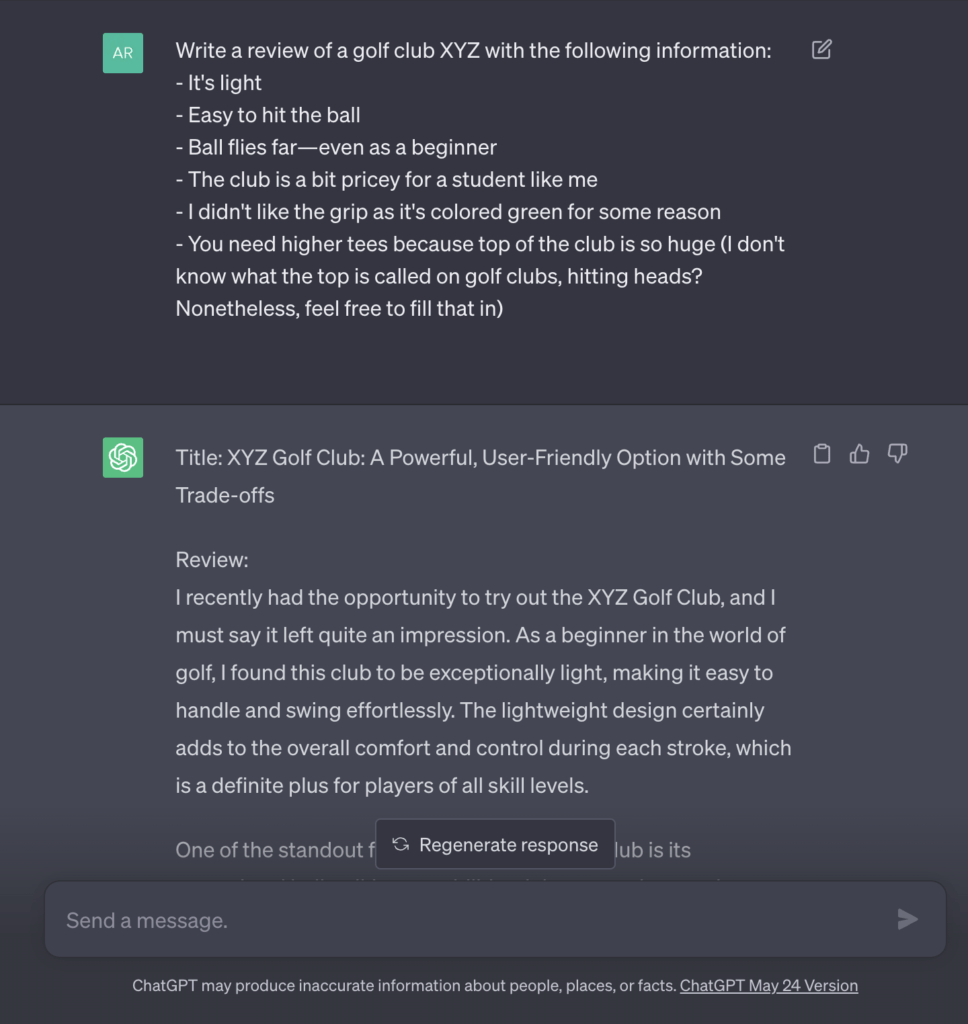
However, it’s critical to note that these notes need to represent your unique perspective.
ChatGPT isn’t really equipped to generate unique ideas or novel approaches on its own. You need to provide the seeds for it to cultivate.
I commonly use ChatGPT to write blog posts about blogging to my readers. With the proper direction, ChatGPT can sometimes speed up my writing workload by 50%.
But this assistance is grounded in the significant groundwork I had already accomplished.
It took me 2.5 years of hard full-time work, to gain the knowledge that I can now delegate to ChatGPT.
In this light, while the assistance of ChatGPT is impressive, it becomes less significant compared to the extensive groundwork required.
Don’t take AI to circumvent the hard work needed to understand your niche and deliver genuine value to your audience. That’s not how it works.
#2 Simplify Complex Topics
One of the key challenges of writing is delivering a clear message.
We’ve all been there — you know what you want to say, but the words just aren’t quite landing.
Here’s where ChatGPT can offer a helping hand. It has a knack for summarizing and simplifying text, making your messages clearer.
Here’s an example:
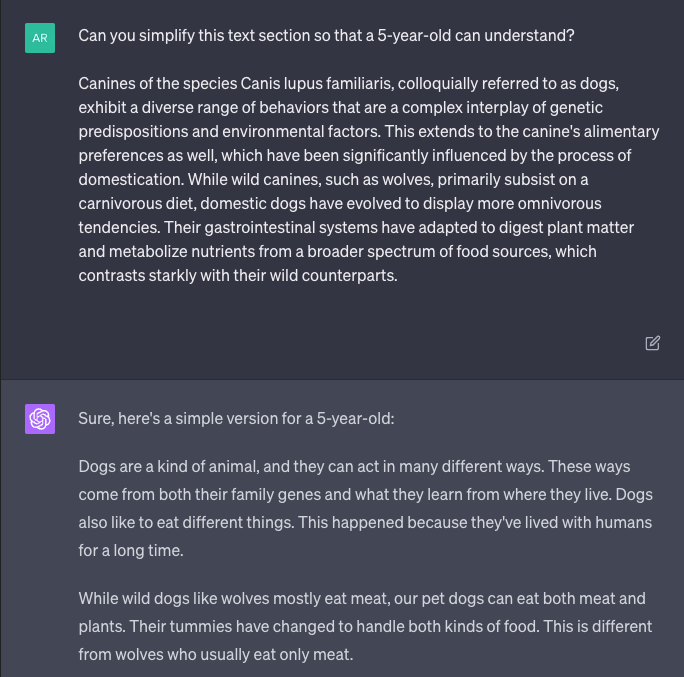
#3 Overcome Writer’s Block
Starting a blog post from a blank page is intimidating.
Fortunately, ChatGPT can help you beat writer’s block by helping you formulate an outline or start writing intros and outros.
For example, in this very blog post, I asked ChatGPT to arrange my ideas into a consistent outline:
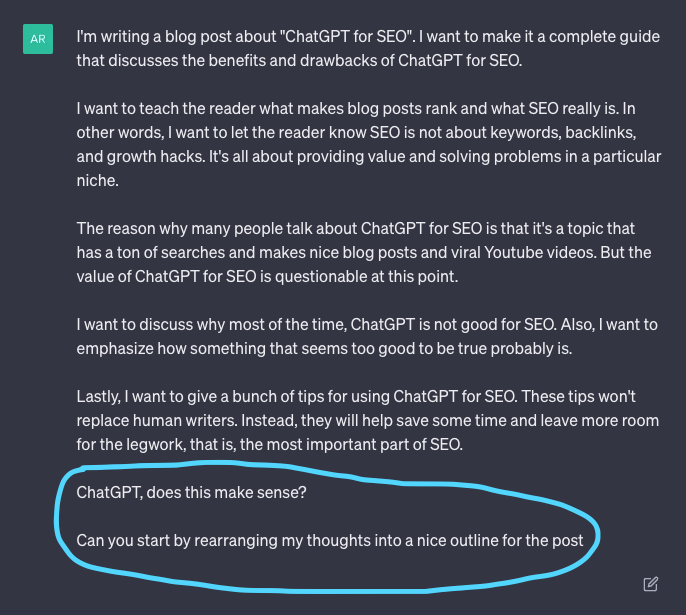
You can do the same!
#4 Basic Information Retrieval
ChatGPT can memorize/look up information. It has a vast pool of general knowledge and can answer a myriad of basic questions in a matter of seconds.
Need a quick rundown of historical events or an explanation of a scientific principle?
ChatGPT has got you covered.
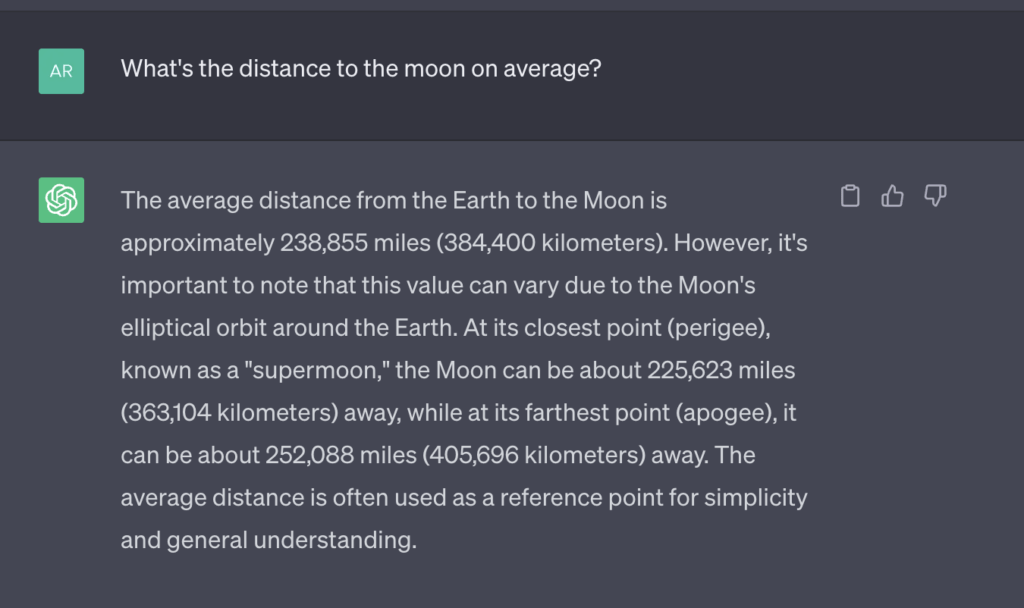
But remember, ChatGPT isn’t infallible and isn’t quite a substitute for doing your own research.
It can provide generally accurate answers on widely researched and documented topics. But it can also get things wrong.
And when it gets things wrong, it can do so quite convincingly.
ChatGPT doesn’t understand the content it generates; it just mirrors the patterns it has been trained on.
This can sometimes lead to misinformation being presented as confidently as fact. This can be detrimental if taken at face value without additional verification.
Also, relying solely on AI for information might make your post sound generic. It can lack the unique insights that you could provide as a human with personal experiences and specific expertise.
#5 Brainstorming Titles
Coming up with a catchy title can be tricky. Yet it’s really important to capture the attention of a searcher in the search results.
Why not let ChatGPT help you brainstorm?
Even if the initial suggestions aren’t perfect, they might spark an idea for the perfect headline.
#6 Coding with ChatGPT
If you’ve got a bit of coding know-how under your belt, you can make use of ChatGPT to craft some basic scripts.
For example, I wanted to create a simple search form for rental cottages on my niche site.
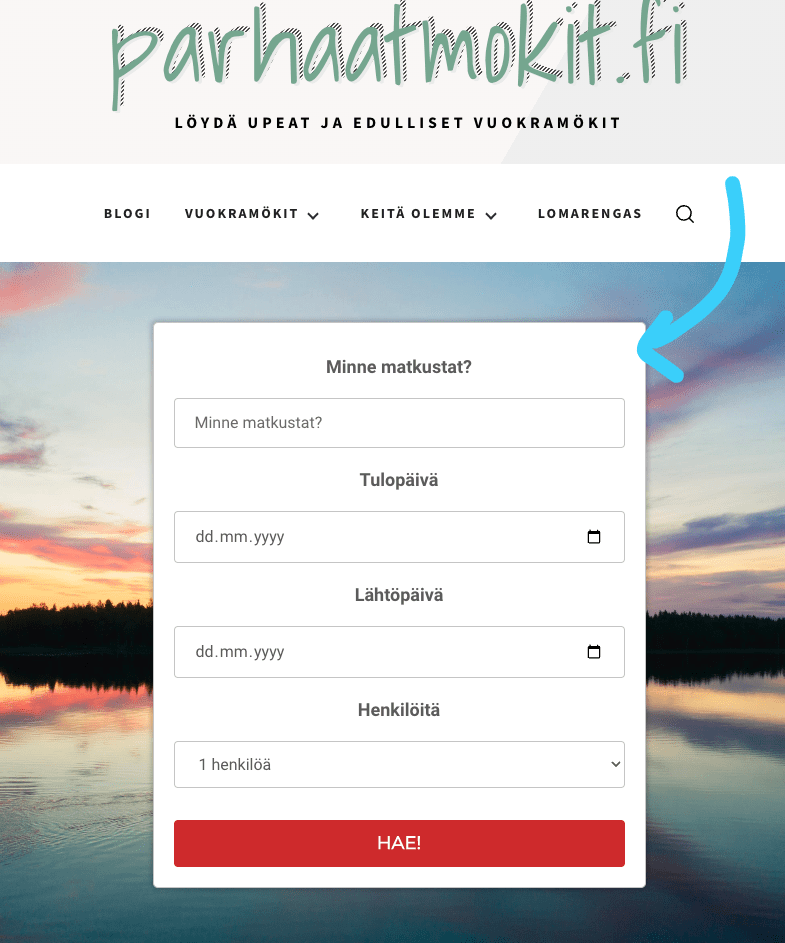
If I were to tackle this task on my own, it would have taken several hours.
But thanks to ChatGPT, I managed to wrap up the task in a quick 30–60 minutes.
The ChatGPT-generated form now makes about $250-$500/month, which is pretty cool.
Anyways, with creative thinking and an understanding of what you need, ChatGPT can be useful in writing some scripts or programs. These can be something you can even add to your blog posts.
For example, if you have a post about how to lose weight, you might incorporate a calorie calculator into the post.
❗ Just remember to be careful when writing code with ChatGPT. Make sure the programs actually work and aren’t doing any damage to your site.
Wrapping Up
Now that’s a wrap!
Keep in mind, SEO isn’t about hacking the system, or the latest fancy tool — it’s about providing real, meaningful value to your audience.
It’s about understanding your readers’ problems and addressing them in a unique and helpful way. 🎯
ChatGPT is indeed an impressive tool — it’s a tireless co-author that can help with simplifying complex text, overcoming writer’s block, brainstorming ideas, and even coding.
But, as we’ve discussed, it’s not a magic SEO wand. It’s a tool, not a replacement for you, the writer. The true magic lies in the unique expertise, creativity, and perspective that you bring to the table. 💫
At the end of the day, your success in SEO doesn’t hinge on AI or any singular tool — it hinges on the value you provide. Google and other search engines want to present their users with quality, helpful content.
By focusing on creating valuable, problem-solving content, you can maximize your chances of ranking high. 💪
And if you find yourself struggling with some aspect of your writing, don’t hesitate to call on your friendly AI assistant, ChatGPT, for help.
Just keep in mind its limitations and use it as a tool to enhance, not replace your own unique voice and expertise. 🤖
Thanks for reading. Happy writing!
PS. ChatGPT Helped Me With This Post—Here’s How
In case you’re curious, here’s how I used ChatGPT to help me write this post.
This post is about 3,000 words in length (including this section).
I had a long chat with ChatGPT where I told exactly what information to include/not include on the post.
- The chat is 7,000 words in length.
- I sent 14 messages in total.
- My messages are 2,500 words in length in total.
So it basically took as long (or even a bit longer) to write the post with ChatGPT than without it.
Now why on earth would I use ChatGPT to write the post if I could do it myself?
ChatGPT is much better at explaining my thoughts than I am. For example, look at this sentence ChatGPT wrote:

And compare it to my input:
ChatGPT cannot think. It basically writes text based on what it has learned on the internet. Thus, it cannot think or know if something is right or wrong.
I think I did a decent job, but I think ChatGPT absolutely nailed it. This illustrates the usefulness of ChatGPT. I’ve got the information and ChatGPT can make it understandable and easy to read!
